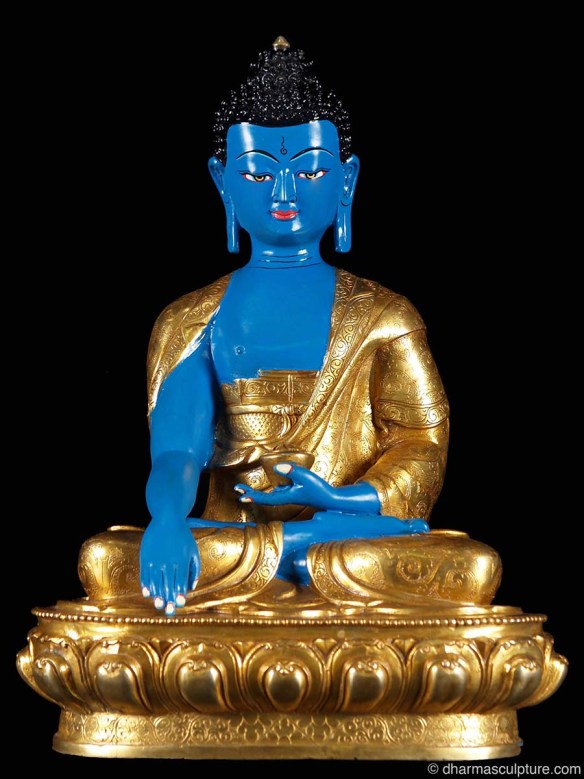This beautiful Shakyamuni Buddha statue is seated in dhyana asana or meditative pose. In this position, the legs are crossed, closely locked with the soles of both feet visible. Lord Buddha is wearing a beautiful detailed carved monastic robe incised with floral motifs. He is seated on a single lotus base also known as padmasana.
The Buddha Shakyamuni, at the moment of enlightenment, invoked the earth as witness, as indicated by the fingers of his right hand, which spread downward in bhumisparsha mudra, “the earth touching gesture”. As the Buddhist sutras narrate, the sun and moon stood still, and all the creatures of the world came to offer respect to the Supreme One who had broken through the boundaries of egocentric existence. All Buddhist art celebrates this moment and leads the viewer toward the Buddha’s experience of selfless and unsurpassed enlightenment.
The first humanlike representations of the Buddha are said to have been drawn on canvas from rays of golden light emanating from his body. Later Buddhist art pictured the Buddha in numerous manifestations, but always as a model of human potential, never as a historically identifiable person. All forms of the Buddha, however, are commonly shown seated on a lotus throne (as seen here), a symbol of the mind’s transcendent nature. As a lotus rises from the mud to bloom unsoiled in open space, so too does the mind rise through the discord of its own experience to blossom in the boundlessness of unconditional awareness.
“Be a light unto yourself,” Buddha Shakyamuni declared at the end of his life. Become a Buddha, an awakened being, he urged, but never a blind follower of tradition.
The piece is made of copper and hand painted. The lotus throne and other parts of the statue are gilded with 24 karat gold. The base of the piece is sealed with a small double vajra symbolizing the balance of the four elements and harmony of the four directions. This statue is a beautiful portrayal of Shakyamuni!
This sculpture was individually handcrafted in Patan, Nepal by master artisans of the Shakya clan who are considered among the best in the world. These craftsmen are the modern heirs to a centuries-old tradition of creating sacred art for use in temples and monasteries. The fine metalworking techniques have been passed down from generation to generation since ancient times.

